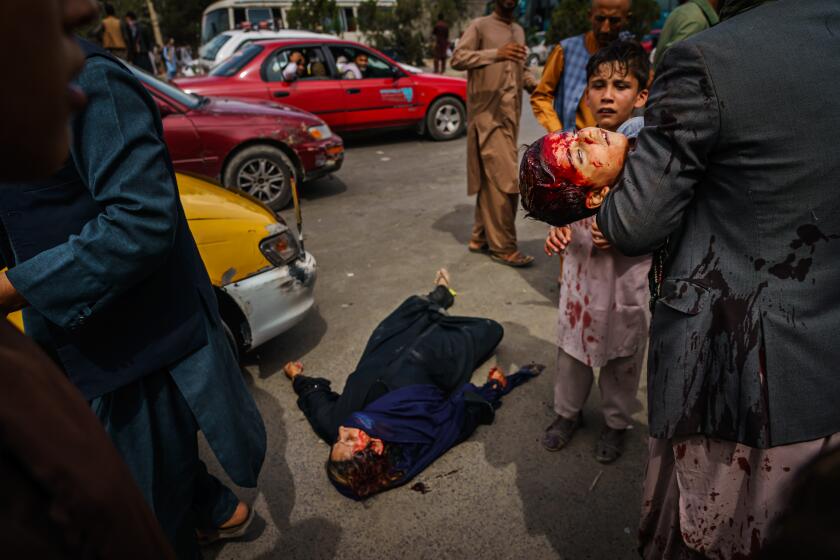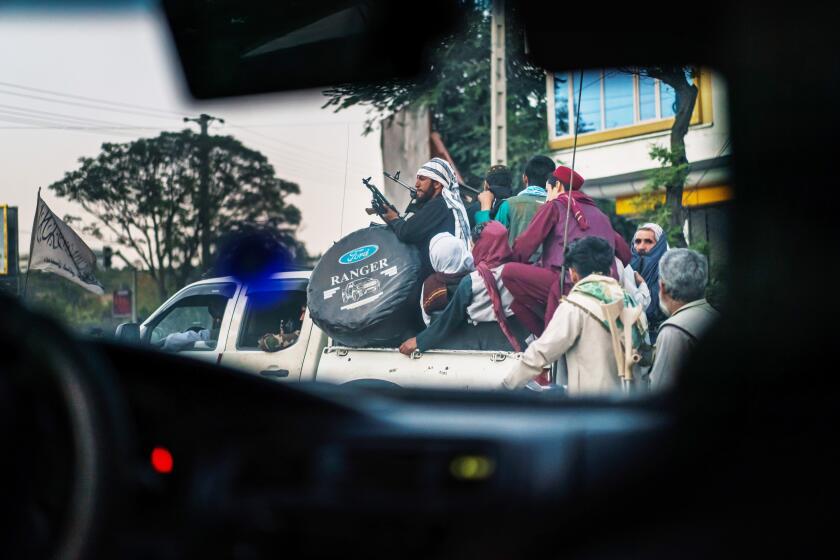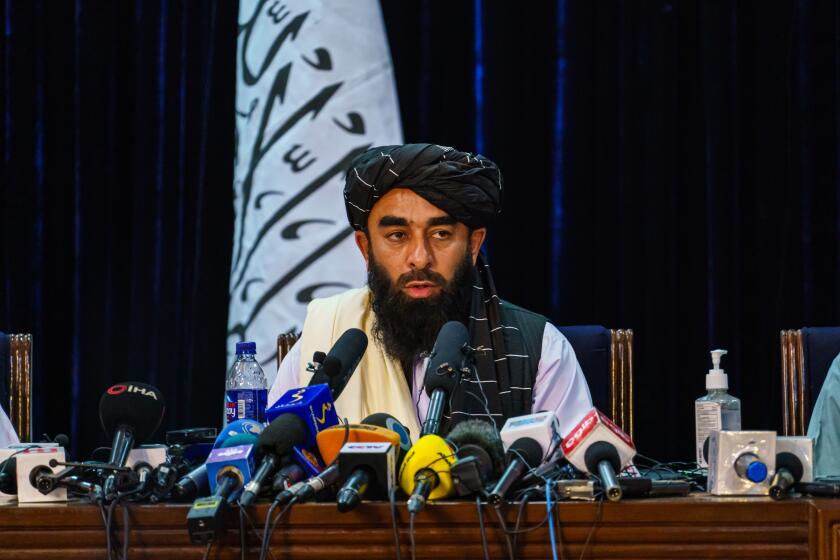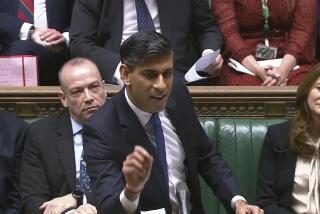British lawmakers — some from his own party — lambaste Boris Johnson over Afghanistan
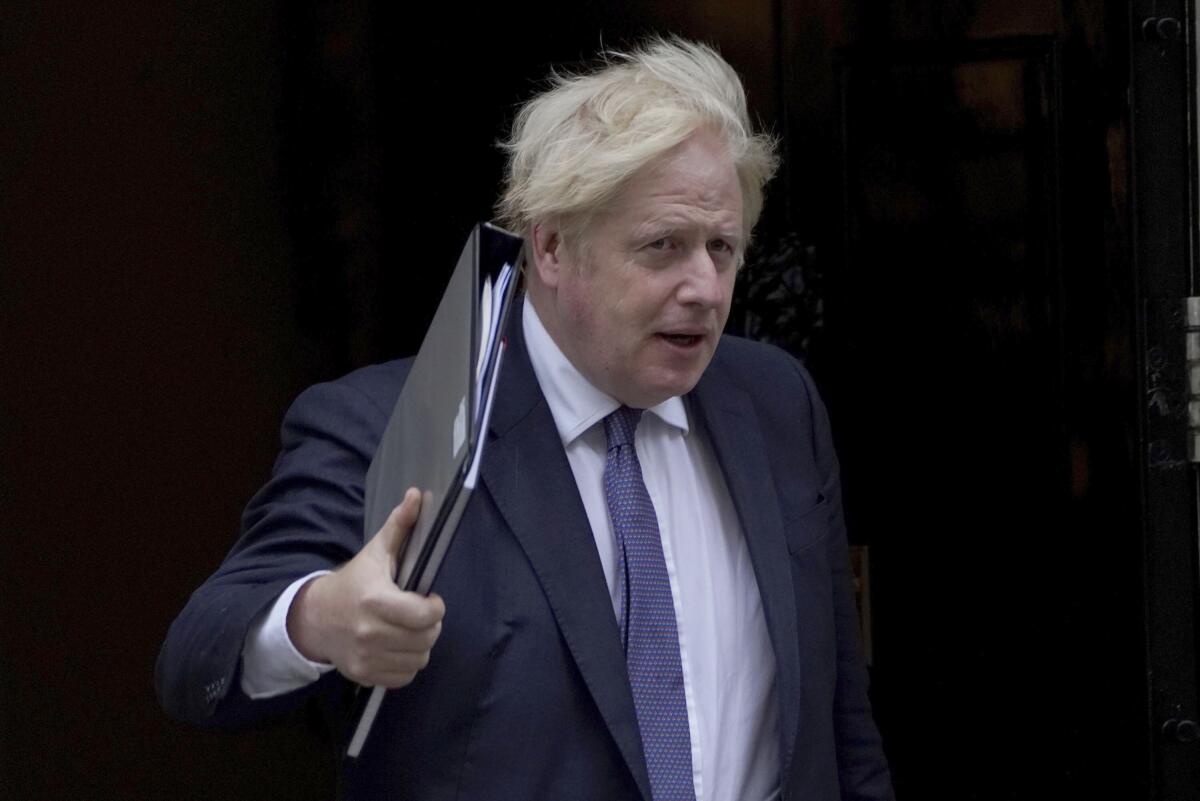
- Share via
LONDON — In a packed and emotional session of Parliament, British Prime Minister Boris Johnson faced accusations Wednesday of abandoning Afghanistan to the whims of the Taliban and of undermining Britain’s position in the world.
During the emergency recall of Parliament, lawmakers, including many from Johnson’s Conservative Party, took turns voicing their regrets and fears over the chaotic turn of events in Afghanistan, where the Taliban has reclaimed control 20 years after being driven out of power by a U.S.-led invasion.
In response, Johnson said he had little choice but to follow in the footsteps of President Biden’s decision to pull U.S. troops out of Afghanistan by the end of August.
“The West could not continue this U.S.-led mission, a mission conceived and executed in support of America, without American logistics, without U.S. air power and without American might,” he said.
“I really think that it is an illusion to believe that there is appetite amongst any of our partners for a continued military presence or for a military solution imposed by NATO in Afghanistan,” he added.
The Taliban used the impending withdrawal of all remaining NATO forces to sweep through Afghanistan in an advance that was faster than anticipated, if not unexpected. Thousands of people have converged on the airport in the capital, Kabul, in a desperate bid to flee as Western nations evacuate their citizens and Afghan employees.
Taliban fighters lash out at a crowd of hundreds corralled outside Kabul’s airport in a tumultuous scene from the U.S. withdrawal and Taliban takeover.
“There’s been a major miscalculation of the resilience of the Afghan forces and a staggering complacency from our government about the Taliban threat,” said Keir Starmer, leader of the opposition Labor Party.
Perhaps the most pointed interventions during the debate came from Johnson’s Conservative ranks, notably his predecessor as premier, Theresa May, who asked whether Johnson felt he had hoped “on a wing and a prayer it’d be all right on the night.”
“We boast about global Britain, but where is global Britain on the streets of Kabul?” she said. “A successful foreign policy strategy will be judged by our deeds, not by our words.”
With the Taliban now in charge of Afghanistan, London’s immediate priority is to evacuate the 4,000 or so British citizens still there and the thousands of Afghans who have helped Britain over the last 20 years.
Protesters in Jalalabad who tried to raise the Afghan national flag in place of the Taliban’s were dispersed by fighters wielding weapons.
Johnson said a “generous” new refugee-settlement program would allow up to 20,000 vulnerable Afghans, primarily women and children, to seek sanctuary in the U.K. over the next few years, including 5,000 this year. The total for this year is in addition to the 5,000 or so Afghan allies that Britain is now trying to evacuate from Kabul’s international airport.
Johnson said Britain would work to unite the international community behind a “clear plan for dealing with the Taliban.” The prime minister, who is the current president of the Group of 7 advanced economies, said he was looking to convene a meeting of the G-7 leaders in the coming days.
“We have agreed that it’d be a mistake for any country to recognize any new regime in Kabul prematurely or bilaterally,” said Johnson, who has spoken with Biden and other world leaders on Afghanistan.
“We will judge this regime on the choices it makes and by its actions, rather than its words,” he added.
The Taliban’s spectacular takeover of Afghanistan has buoyed the spirits of their Islamic brothers-in-arms throughout the world.
The refugee plan, which is similar to a program for Syrians in 2015, came under immediate attack from lawmakers, who said it fell short of what was required, both in terms of speed and numbers.
“The government has said 5,000 will be brought to resettle in the U.K. this year,” said Chris Bryant, a Labor lawmaker. “What are the other 15,000 meant to do? Hang around and wait to be executed?”
Johnson said that British officials were doing all they could regarding evacuations and that the Taliban has not sought to disrupt that operation.
“The situation has stabilized since the weekend, but it remains precarious, and the U.K. officials on the ground are doing everything that they can to expedite the movement of people,” Johnson said. “At the moment, it would be fair to say that the Taliban [is] allowing that evacuation to go ahead.”
Breaking News
Get breaking news, investigations, analysis and more signature journalism from the Los Angeles Times in your inbox.
You may occasionally receive promotional content from the Los Angeles Times.
For many, if not most, British lawmakers, the evacuation represents a huge failure for Britain’s Afghanistan mission, which saw 457 British troops die in the protracted effort to stabilize the country.
“Let’s stop talking about ‘forever wars.’ Let’s recognize that forever peace is bought not cheaply but hard through determination and the will to endure,” said lawmaker Tom Tugendhat, chairman of the influential Foreign Affairs Committee.
“And the tragedy of Afghanistan is that we’re swapping that patient achievement for a second fire and a second war,” said Tugendhat, who served with the British military in Afghanistan and Iraq.
While the lawmakers debated inside Parliament, dozens of former interpreters for the British army protested outside, holding banners and signs that included images of people gravely injured in Afghanistan and the caption, “Protect our loved ones.”
Scores more people joined the interpreters, forming a crowd of around 200. Women and children came bearing posters, red balloons and flags of Afghanistan painted on their cheeks.
More to Read
Sign up for Essential California
The most important California stories and recommendations in your inbox every morning.
You may occasionally receive promotional content from the Los Angeles Times.
